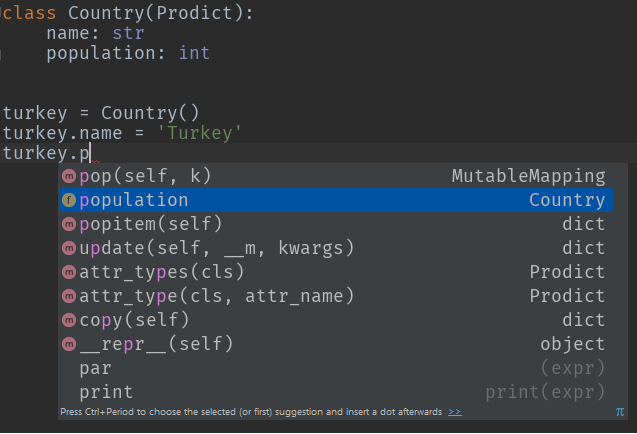Wherein I Answer the Question That Was Asked
Why doesn't Python offer it out of the box?
I suspect that it has to do with the Zen of Python: "There should be one -- and preferably only one -- obvious way to do it." This would create two obvious ways to access values from dictionaries: obj['key'] and obj.key.
Caveats and Pitfalls
These include possible lack of clarity and confusion in the code. i.e., the following could be confusing to someone else who is going in to maintain your code at a later date, or even to you, if you're not going back into it for awhile. Again, from Zen: "Readability counts!"
>>> KEY = 'spam'
>>> d[KEY] = 1
>>> # Several lines of miscellaneous code here...
... assert d.spam == 1
If d is instantiated or KEY is defined or d[KEY] is assigned far away from where d.spam is being used, it can easily lead to confusion about what's being done, since this isn't a commonly-used idiom. I know it would have the potential to confuse me.
Additonally, if you change the value of KEY as follows (but miss changing d.spam), you now get:
>>> KEY = 'foo'
>>> d[KEY] = 1
>>> # Several lines of miscellaneous code here...
... assert d.spam == 1
Traceback (most recent call last):
File "<stdin>", line 2, in <module>
AttributeError: 'C' object has no attribute 'spam'
IMO, not worth the effort.
Other Items
As others have noted, you can use any hashable object (not just a string) as a dict key. For example,
>>> d = {(2, 3): True,}
>>> assert d[(2, 3)] is True
>>>
is legal, but
>>> C = type('C', (object,), {(2, 3): True})
>>> d = C()
>>> assert d.(2, 3) is True
File "<stdin>", line 1
d.(2, 3)
^
SyntaxError: invalid syntax
>>> getattr(d, (2, 3))
Traceback (most recent call last):
File "<stdin>", line 1, in <module>
TypeError: getattr(): attribute name must be string
>>>
is not. This gives you access to the entire range of printable characters or other hashable objects for your dictionary keys, which you do not have when accessing an object attribute. This makes possible such magic as a cached object metaclass, like the recipe from the Python Cookbook (Ch. 9).
Wherein I Editorialize
I prefer the aesthetics of spam.eggs over spam['eggs'] (I think it looks cleaner), and I really started craving this functionality when I met the namedtuple. But the convenience of being able to do the following trumps it.
>>> KEYS = 'spam eggs ham'
>>> VALS = [1, 2, 3]
>>> d = {k: v for k, v in zip(KEYS.split(' '), VALS)}
>>> assert d == {'spam': 1, 'eggs': 2, 'ham': 3}
>>>
This is a simple example, but I frequently find myself using dicts in different situations than I'd use obj.key notation (i.e., when I need to read prefs in from an XML file). In other cases, where I'm tempted to instantiate a dynamic class and slap some attributes on it for aesthetic reasons, I continue to use a dict for consistency in order to enhance readability.
I'm sure the OP has long-since resolved this to his satisfaction, but if he still wants this functionality, then I suggest he download one of the packages from pypi that provides it:
Bunch is the one I'm more familiar with. Subclass of dict, so you have all that functionality.AttrDict also looks like it's also pretty good, but I'm not as familiar with it and haven't looked through the source in as much detail as I have Bunch.- Addict Is actively maintained and provides attr-like access and more.
- As noted in the comments by Rotareti, Bunch has been deprecated, but there is an active fork called Munch.
However, in order to improve readability of his code I strongly recommend that he not mix his notation styles. If he prefers this notation then he should simply instantiate a dynamic object, add his desired attributes to it, and call it a day:
>>> C = type('C', (object,), {})
>>> d = C()
>>> d.spam = 1
>>> d.eggs = 2
>>> d.ham = 3
>>> assert d.__dict__ == {'spam': 1, 'eggs': 2, 'ham': 3}
Wherein I Update, to Answer a Follow-Up Question in the Comments
In the comments (below), Elmo asks:
What if you want to go one deeper? ( referring to type(...) )
While I've never used this use case (again, I tend to use nested dict, for
consistency), the following code works:
>>> C = type('C', (object,), {})
>>> d = C()
>>> for x in 'spam eggs ham'.split():
... setattr(d, x, C())
... i = 1
... for y in 'one two three'.split():
... setattr(getattr(d, x), y, i)
... i += 1
...
>>> assert d.spam.__dict__ == {'one': 1, 'two': 2, 'three': 3}

collections.namedtupleis very useful for this.easydict.EasyDict